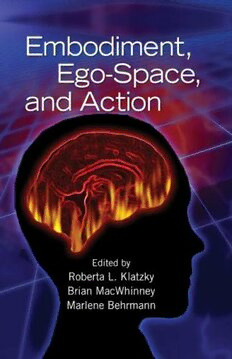Download Embodiment, Ego-Space, and Action (Carnegie Mellon Symposia on Cognition) PDF Free - Full Version
Download Embodiment, Ego-Space, and Action (Carnegie Mellon Symposia on Cognition) by Roberta L. Klatzky, Brian MacWhinney, Marlene Behrmann in PDF format completely FREE. No registration required, no payment needed. Get instant access to this valuable resource on PDFdrive.to!
About Embodiment, Ego-Space, and Action (Carnegie Mellon Symposia on Cognition)
The majority of research on human perception and action examines sensors and effectors in relative isolation. What is less often considered in these research domains is that humans interact with a perceived world in which they themselves are part of the perceptual representation, as are the positions and actions (potential or ongoing) of other active beings. It is this self-in-world representation that we call embodiment. Increasingly, research demonstrates that embodiment is fundamental to both executing and understanding spatially and interpersonally directed action. It has been theorized to play a role in reaching and grasping, locomotion and navigation, infant imitation, spatial and social perspective taking, and neurological dysfunctions as diverse as phantom limb pain and autism. Few formal ideas have been put forward, however, to describe how selfrepresentation functions at a mechanistic level and what neural structures support those functions. This volume reports on the 2006 Carnegie Symposium on Cognition, which brought together the contributions to these issues from a group of researchers who span perspectives of behavioral science, neuroscience, developmental psychology and computation. Together they share their findings, ideas, aspirations, and concerns.
Detailed Information
| Author: | Roberta L. Klatzky, Brian MacWhinney, Marlene Behrmann |
|---|---|
| Publication Year: | 2008 |
| ISBN: | 9781410616913 |
| Pages: | 448 |
| Language: | English |
| File Size: | 5.407 |
| Format: | |
| Price: | FREE |
Safe & Secure Download - No registration required
Why Choose PDFdrive for Your Free Embodiment, Ego-Space, and Action (Carnegie Mellon Symposia on Cognition) Download?
- 100% Free: No hidden fees or subscriptions required for one book every day.
- No Registration: Immediate access is available without creating accounts for one book every day.
- Safe and Secure: Clean downloads without malware or viruses
- Multiple Formats: PDF, MOBI, Mpub,... optimized for all devices
- Educational Resource: Supporting knowledge sharing and learning
Frequently Asked Questions
Is it really free to download Embodiment, Ego-Space, and Action (Carnegie Mellon Symposia on Cognition) PDF?
Yes, on https://PDFdrive.to you can download Embodiment, Ego-Space, and Action (Carnegie Mellon Symposia on Cognition) by Roberta L. Klatzky, Brian MacWhinney, Marlene Behrmann completely free. We don't require any payment, subscription, or registration to access this PDF file. For 3 books every day.
How can I read Embodiment, Ego-Space, and Action (Carnegie Mellon Symposia on Cognition) on my mobile device?
After downloading Embodiment, Ego-Space, and Action (Carnegie Mellon Symposia on Cognition) PDF, you can open it with any PDF reader app on your phone or tablet. We recommend using Adobe Acrobat Reader, Apple Books, or Google Play Books for the best reading experience.
Is this the full version of Embodiment, Ego-Space, and Action (Carnegie Mellon Symposia on Cognition)?
Yes, this is the complete PDF version of Embodiment, Ego-Space, and Action (Carnegie Mellon Symposia on Cognition) by Roberta L. Klatzky, Brian MacWhinney, Marlene Behrmann. You will be able to read the entire content as in the printed version without missing any pages.
Is it legal to download Embodiment, Ego-Space, and Action (Carnegie Mellon Symposia on Cognition) PDF for free?
https://PDFdrive.to provides links to free educational resources available online. We do not store any files on our servers. Please be aware of copyright laws in your country before downloading.
The materials shared are intended for research, educational, and personal use in accordance with fair use principles.

